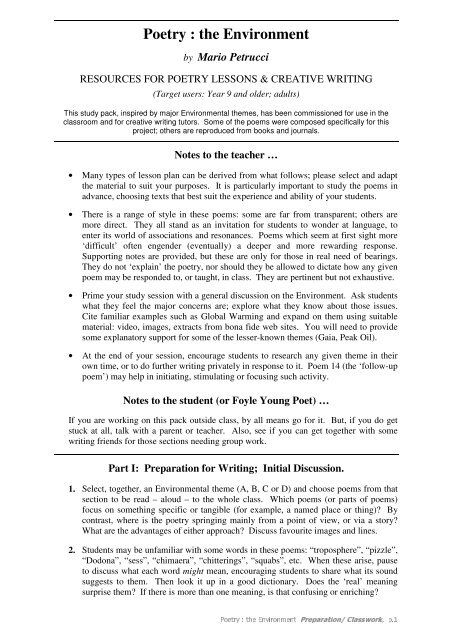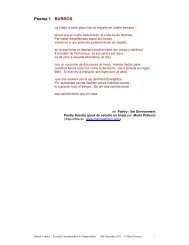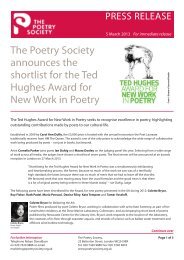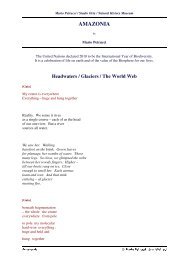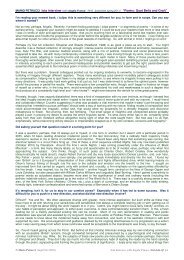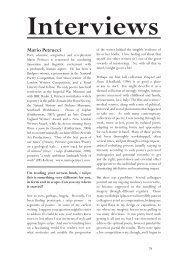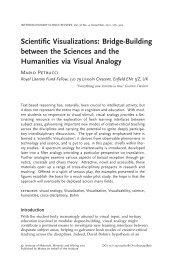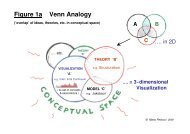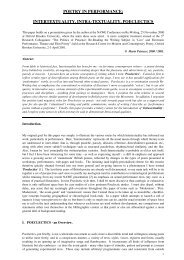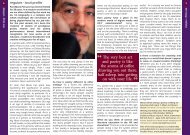You also want an ePaper? Increase the reach of your titles
YUMPU automatically turns print PDFs into web optimized ePapers that Google loves.
<strong>Poetry</strong> : <strong>the</strong> <strong>Environment</strong><br />
by <strong>Mario</strong> <strong>Petrucci</strong><br />
RESOURCES FOR POETRY LESSONS & CREATIVE WRITING<br />
(Target users: Year 9 and older; adults)<br />
This study pack, inspired by major <strong>Environment</strong>al <strong>the</strong>mes, has been commissioned for use in <strong>the</strong><br />
classroom and for creative writing tutors. Some of <strong>the</strong> poems were composed specifically for this<br />
project; o<strong>the</strong>rs are reproduced from books and journals.<br />
Notes to <strong>the</strong> teacher …<br />
• Many types of lesson plan can be derived from what follows; please select and adapt<br />
<strong>the</strong> material to suit your purposes. It is particularly important to study <strong>the</strong> poems in<br />
advance, choosing texts that best suit <strong>the</strong> experience and ability of your students.<br />
• There is a range of style in <strong>the</strong>se poems: some are far from transparent; o<strong>the</strong>rs are<br />
more direct. They all stand as an invitation for students to wonder at language, to<br />
enter its world of associations and resonances. Poems which seem at first sight more<br />
‘difficult’ often engender (eventually) a deeper and more rewarding response.<br />
Supporting notes are provided, but <strong>the</strong>se are only for those in real need of bearings.<br />
They do not ‘explain’ <strong>the</strong> poetry, nor should <strong>the</strong>y be allowed to dictate how any given<br />
poem may be responded to, or taught, in class. They are pertinent but not exhaustive.<br />
• Prime your study session with a general discussion on <strong>the</strong> <strong>Environment</strong>. Ask students<br />
what <strong>the</strong>y feel <strong>the</strong> major concerns are; explore what <strong>the</strong>y know about those issues.<br />
Cite familiar examples such as Global Warming and expand on <strong>the</strong>m using suitable<br />
material: video, images, extracts from bona fide web sites. You will need to provide<br />
some explanatory support for some of <strong>the</strong> lesser-known <strong>the</strong>mes (Gaia, Peak Oil).<br />
• At <strong>the</strong> end of your session, encourage students to research any given <strong>the</strong>me in <strong>the</strong>ir<br />
own time, or to do fur<strong>the</strong>r writing privately in response to it. Poem 14 (<strong>the</strong> ‘follow-up<br />
poem’) may help in initiating, stimulating or focusing such activity.<br />
Notes to <strong>the</strong> student (or Foyle Young Poet) …<br />
If you are working on this pack outside class, by all means go for it. But, if you do get<br />
stuck at all, talk with a parent or teacher. Also, see if you can get toge<strong>the</strong>r with some<br />
writing friends for those sections needing group work.<br />
Part I: Preparation for Writing; Initial Discussion.<br />
1. Select, toge<strong>the</strong>r, an <strong>Environment</strong>al <strong>the</strong>me (A, B, C or D) and choose poems from that<br />
section to be read – aloud – to <strong>the</strong> whole class. Which poems (or parts of poems)<br />
focus on something specific or tangible (for example, a named place or thing)? By<br />
contrast, where is <strong>the</strong> poetry springing mainly from a point of view, or via a story?<br />
What are <strong>the</strong> advantages of ei<strong>the</strong>r approach? Discuss favourite images and lines.<br />
2. Students may be unfamiliar with some words in <strong>the</strong>se poems: “troposphere”, “pizzle”,<br />
“Dodona”, “sess”, “chimaera”, “chitterings”, “squabs”, etc. When <strong>the</strong>se arise, pause<br />
to discuss what each word might mean, encouraging students to share what its sound<br />
suggests to <strong>the</strong>m. Then look it up in a good dictionary. Does <strong>the</strong> ‘real’ meaning<br />
surprise <strong>the</strong>m? If <strong>the</strong>re is more than one meaning, is that confusing or enriching?
3. Is <strong>the</strong> idea behind each poem fairly clear? Or do some passages seem strange and<br />
puzzling? Examine those passages toge<strong>the</strong>r, but avoid any temptation to somehow<br />
‘decode’ <strong>the</strong>m or explain <strong>the</strong>m away. Instead, explore <strong>the</strong> impact of <strong>the</strong>ir sound and<br />
associations. Which images and phrases encourage us to struggle with what we know<br />
about ourselves and nature, or to engage more deeply with language?<br />
4. Should a poem be absolutely clear in its intentions, or leave room for <strong>the</strong> mysterious?<br />
Why would a poem give us – or refuse to give us – obvious or predictable meanings?<br />
Do we expect song lyrics or music to always make logical, obvious sense – or is<br />
poetry different? Set up a debate on <strong>the</strong>se questions, using examples from <strong>the</strong> poems<br />
supplied (or o<strong>the</strong>r poems that <strong>the</strong>y already know) to illustrate points.<br />
Part II: Some <strong>Environment</strong>al writing ideas …<br />
(Suggestions for students, ei<strong>the</strong>r for individual class work or as follow-up)<br />
1. Which poem most helps you to feel or think differently about its <strong>the</strong>me? How so?<br />
Does it draw you into its world and make you thoughtful, or is its main effect to excite<br />
and provoke you? Jot down your responses to that poem, including your own insights<br />
arising from it. Compose something, and structure it, to capture what you find.<br />
2. Which poem do you most want to go back to, privately, to read again? What qualities<br />
in that poem make you want to revisit it? Having read it several times, does it reward<br />
your patience? Write something that incorporates any insights or feelings that arise.<br />
3. Pick up a single object, or idea, from any poem in this pack. Make notes on it: your<br />
reactions, memories, images, imaginings. Do some research. The notes can be messy<br />
and fragmentary, or coherent and clear, depending on what is going on in your head.<br />
When ready, turn your notes into a voice, ei<strong>the</strong>r in a poem (as a monologue or<br />
conversation) or in prose (as a speech or dialogue). Do any of <strong>the</strong> supplied poems<br />
help you in creating a good voice? If so, do you want to: (a) imitate that voice; or (b)<br />
make something entirely your own? What are <strong>the</strong> pros and cons of each approach?<br />
4. Go outside: search for writing ideas by observing nature. Take your time.<br />
5. Do you consider yourself an integral part of nature? Write a poem in answer.<br />
Part III: Editing<br />
(Group/ Class Work)<br />
• Allow time for most of <strong>the</strong> class to get to a first draft. Ask for a few of <strong>the</strong>se to be<br />
read out to <strong>the</strong> group, encouraging readers not to read too fast or under <strong>the</strong> breath.<br />
Allow silences. Go deeply into what is happening in each poem. What can we learn<br />
from one ano<strong>the</strong>r’s work? How is our own writing enriched by hearing o<strong>the</strong>r voices?<br />
• Discuss (constructively) what alterations might be made to each poem, to deepen or<br />
assist its effect (if it helps, ask for <strong>the</strong> author to read out <strong>the</strong>ir draft again). House<br />
rule: authors are barred from <strong>the</strong> discussion of <strong>the</strong>ir work, at least initially. (Why?)<br />
• Is <strong>the</strong>re agreement over <strong>the</strong> suggestions being made? Do <strong>the</strong> proposed changes<br />
amplify <strong>the</strong> poem’s capacity to show us something, or is some essential quality about<br />
to be lost in <strong>the</strong> editing? Is a better balance now struck between mystery and clarity?<br />
• Towards <strong>the</strong> end of each discussion, invite <strong>the</strong> (so far) silenced author to respond.<br />
• Now run a plenary redrafting session. Those who did not have <strong>the</strong>ir work worked<br />
over can still apply insights from <strong>the</strong> discussion to <strong>the</strong>ir own drafts. Or pair students<br />
up for a while, to edit <strong>the</strong>ir partner’s text. At a suitable point, ask for some first and<br />
second drafts to be read out, side by side, for comparison. Discuss.
Ecopoems (next section)<br />
Theme A: Global Warming<br />
Poem 1 Orders of Magnitude<br />
Poem 2 in hay waist-deep was<br />
Poem 3 Dover<br />
Contents<br />
Theme B: Oil/ Peak Oil (Our petrol-thirsty world; <strong>the</strong> end of <strong>the</strong> Oil Age)<br />
Poem 4 from a to a<br />
Poem 5 Repossession<br />
Poem 6 Hubbert’s Peak<br />
Poem 7 Donkeys<br />
Theme C: Deforestation<br />
Poem 8 Sapling<br />
Poem 9 Dodona<br />
Poem 10 Deserted<br />
Theme D: Gaia (Life as <strong>the</strong> real worldwide web)<br />
Poem 11 Exposures<br />
Poem 12 Pangaea<br />
Poem 13 that guy—a<br />
Follow-up: Decision Time<br />
Poem 14 left or right<br />
Support Notes on <strong>the</strong> poems; some teaching suggestions (in final section).<br />
Support for Theme A: Global Warming<br />
Support for Theme B: Oil/ Peak Oil<br />
Support for Theme C: Deforestation<br />
Support for Theme D: Gaia<br />
Support for Follow-up: Decision Time<br />
<strong>Mario</strong> <strong>Petrucci</strong> trained as a physicist and ecologist before becoming a freelance educator and poet. His awardwinning<br />
collections reflect his scientific and ecological concerns: <strong>the</strong>y include Bosco (2001), Heavy Water: a<br />
poem for Chernobyl (2004) and Flowers of Sulphur (2007) [www.mariopetrucci.com].<br />
Student’s notes …<br />
© <strong>Mario</strong> <strong>Petrucci</strong> 2008
ORDERS OF MAGNITUDE<br />
One hundred thousand trillion joules<br />
to turn an ice cap into mush<br />
One hundred thousand billion joules<br />
to erase a major Eastern city<br />
A hundred thousand million joules<br />
to run a car to death<br />
One hundred million of <strong>the</strong> same<br />
for Fire Brigades to reach <strong>the</strong> kitten<br />
Ten million just to keep<br />
December from cold feet<br />
A hundred thousand joules for a mug<br />
of tea – A hundred joules<br />
for a second’s worth of War and Peace<br />
Ten to raise a hand – to lift<br />
an average apple to <strong>the</strong> lips<br />
A single joule to shout <strong>the</strong> command<br />
Half a joule to pull <strong>the</strong> trigger<br />
Just one tenth to push <strong>the</strong> button<br />
Almost zero to have <strong>the</strong> thought.<br />
POEM 1 Global Warming: Energy<br />
© <strong>Mario</strong> <strong>Petrucci</strong> 2008<br />
From: Flowers of Sulphur (Enitharmon, 2007)
POEM 2 Global Warming: Agriculture<br />
Patterns of rainfall will change dramatically with Global Warming:<br />
Britain’s is set to increase, probably with more frequent flash floods.<br />
in hay waist-deep was<br />
uncle who said he saw<br />
lash of rain snap<br />
upward viper-<br />
sharp to bite<br />
<strong>the</strong> coming-down<br />
tail – ano<strong>the</strong>r tending<br />
eaves at top of ladder<br />
felt on his back<br />
drops<br />
worse than<br />
wasps to a sack<br />
while wife with foot<br />
hard on bottom rung<br />
kept her face of<br />
tinder – yet<br />
ano<strong>the</strong>r<br />
watched brown<br />
slick of cloud a few<br />
metres up suck back its<br />
centre like a seam<br />
in <strong>the</strong> roasted<br />
bean – till it<br />
split with blue &<br />
for an hour all air smelt<br />
of coffee – last it came to<br />
me i said once<br />
i stood<br />
in rain so<br />
ferocious streams<br />
front & back met at my<br />
pizzle till i knew how it felt<br />
to piss like Orion: i said<br />
this happened –<br />
but <strong>the</strong>y<br />
laughed & took out<br />
scy<strong>the</strong>s & said <strong>the</strong> hay was<br />
dry enough<br />
© <strong>Mario</strong> <strong>Petrucci</strong> 2008
DOVER<br />
That morning <strong>the</strong> sea was late –<br />
each swill at its edge mutely<br />
lapping salt-mown grass<br />
as though land had so<br />
stilled itself as to bring<br />
ocean with it – brimming<br />
where it stalled with green and<br />
chalk – fizzing into water<br />
like pale demerara.<br />
One foot – getting wet through<br />
my sole. Over one shoulder<br />
hills below <strong>the</strong> lazy level<br />
of slop. Those wavelets almost<br />
true with synapse trees now<br />
ready for <strong>the</strong> hue –<br />
each curve of chalk<br />
still velvet with it. Frozen<br />
at full swell. Mortal. Like some<br />
heavy shot of a final sea.<br />
POEM 3 Global Warming: Sea Levels<br />
© <strong>Mario</strong> <strong>Petrucci</strong> 2008
from a to a<br />
or Getting Nowhere<br />
finding <strong>the</strong> freeway<br />
to myself i put my foot<br />
down to my own motive<br />
floorboards asking <strong>the</strong> rear<br />
-view what to do<br />
next<br />
it said<br />
bro<strong>the</strong>r<br />
<strong>the</strong> faster you<br />
eat me up <strong>the</strong> more you<br />
leave behind – you’ll see<br />
more of me slower so why not<br />
pull over ’cause this road is going<br />
backwards and your incessant<br />
tyres are speeding up<br />
<strong>the</strong> world<br />
POEM 4 Oil: <strong>the</strong> Motor Car<br />
© <strong>Mario</strong> <strong>Petrucci</strong> 2008<br />
Published in: Envoi magazine (#147)
REPOSSESSION (excerpts)<br />
Down <strong>the</strong> long leg of <strong>the</strong> catwalker fishnet melts<br />
to meshwork tobacco spittle. A black liquid garter.<br />
Asphalt picks itself up – each scaly skin spread<br />
between kerbstones is pulling free with a bass<br />
pop. Every city suddenly a kicked nest of adders<br />
coiling toge<strong>the</strong>r into a spitting rope of pitch …<br />
Videos slime in <strong>the</strong> hand like<br />
jumbo choc-ices. CDs in <strong>the</strong> rack pucker and shrink<br />
to mushy black peas. Dentures gum up <strong>the</strong> works<br />
jarred into toothless gaga. Those precise blocks<br />
and avenues of electronics crinkle dark and<br />
mediaeval. In <strong>the</strong> fast lane of <strong>the</strong> bowling alley<br />
a caviar cannonball splashes ten full bottles of<br />
devil’s milk …<br />
Yes every<br />
biro mothball racquet sags bleeds gutters<br />
till <strong>the</strong> black string vest of tributaries resolves –<br />
untangles towards tonsured ozone. Finally<br />
we notice. On satellite-replays Presidents track<br />
<strong>the</strong>ir sloed candyfloss economies writhing round<br />
earth’s spindle – are caught on camera in black lip-<br />
stick salve leaning to kiss <strong>the</strong> screen goodbye – and for<br />
that moment <strong>the</strong> globe has a single ga<strong>the</strong>ring purpose<br />
as a girl glances up from her fractions to witness<br />
those filaments merge to a mo<strong>the</strong>r of twisters –<br />
merge and rise and take her place. She watches<br />
<strong>the</strong> whole black mass lift up and out into daytime<br />
where it balls itself – steadies a wobbling edge<br />
against blue to sling <strong>the</strong>re its low fat circle. Crude<br />
and glossy. She sees <strong>the</strong> birth of <strong>the</strong> full black moon<br />
that lights our ways with dark.<br />
POEM 5 Oil: Oil-dependency<br />
© <strong>Mario</strong> <strong>Petrucci</strong> 2008<br />
From: Earth Shattering: Ecopoems (Bloodaxe, 2007)
Globally, oil production will peak circa 2010.<br />
Hubbert’s Peak<br />
from afar – almost a poplar<br />
in desert<br />
stained brown with human wea<strong>the</strong>r<br />
fanning up one<br />
blue-green flame where flatness runs off<br />
<strong>the</strong> chart I trudge to<br />
make <strong>the</strong> tree grow – my soft body driving me<br />
through late-morning<br />
heat as my mostly-water pound after pound in losing<br />
pence-worth sweat de-<br />
hydrates me – so this verdant spike nations have driven<br />
herds to (if stripped<br />
of a few leaves) wilts – I could have driven too but walked<br />
to find <strong>the</strong> tree<br />
false – a shadeless sideways-on range I could scrabble up if<br />
younger if I had<br />
energy : stone pinnacle swaying with my weight & needled<br />
by those shimmers<br />
faltering computers make – although no one climbs down<br />
those windward slopes<br />
so fully masked in noon<br />
– down sharp curves of what a younger sun bought his<br />
blue girl to make her fizzy<br />
& blackcurrant-full of juice – ousted now from his<br />
sleek limo onto a wagon<br />
to places greens once grew with a world in tow<br />
& <strong>the</strong> peak throwing its<br />
first stub of soon-to-be gun-barrel shadow<br />
I’ll later die cold in<br />
in spite of this squinting into an end<br />
-less gold-<br />
rush gush-down<br />
sun<br />
POEM 6 Peak Oil: <strong>the</strong> end of <strong>the</strong> Oil Age<br />
© <strong>Mario</strong> <strong>Petrucci</strong> 2008
DONKEYS<br />
The short-term view was a four-stroke fool –<br />
now <strong>the</strong> car’s extinct <strong>the</strong> mule must rule.<br />
For having squandered that liquid sun<br />
it’s back to a horsepower precisely of one<br />
where filling up means buckets and attention to dung.<br />
The kind of Ferrari you get down our way<br />
does nought to sixty kilometres (per day)<br />
on two bales of hay. We made for our backs<br />
a cross like <strong>the</strong> donkey’s – but painted black.<br />
Well. If this is entropy <strong>the</strong>n its laws are an ass<br />
that ekes us through <strong>the</strong> eye of <strong>the</strong> Energy Pass.<br />
Down empty freeways our donkeys now plod –<br />
<strong>the</strong>y knew all <strong>the</strong> while. Hence that asinine smile –<br />
<strong>the</strong> endless nod.<br />
POEM 7 Oil: some lighter relief…<br />
© <strong>Mario</strong> <strong>Petrucci</strong> 2008
SAPLING<br />
Twilight, each morning<br />
before <strong>the</strong> mist<br />
he slips his Mo<strong>the</strong>r’s<br />
hive, for <strong>the</strong> forest.<br />
There is a glade<br />
a secret place where<br />
he sits. While Mo<strong>the</strong>r<br />
and Fa<strong>the</strong>r embrace<br />
sleep, his eyes sip<br />
small movements of earth<br />
<strong>the</strong> clay knots of worms.<br />
There is no reason<br />
for this. He grows roots<br />
while <strong>the</strong> sun rises<br />
follows rough limbs<br />
of oak across shifting<br />
cloud, where broad daylight<br />
seeps from greyness.<br />
Here he can taste<br />
<strong>the</strong> newness of grass<br />
fill his ear’s belly<br />
with spangles of finch<br />
<strong>the</strong> chitterings of squabs<br />
soft words from a wood-pigeon.<br />
A cuckoo’s woodwind<br />
sounds him out.<br />
This entire forest creeps<br />
through his nostrils<br />
fills his head with light<br />
bright and true. He knows<br />
that soon he must go<br />
to school. His parents will<br />
put a stop to all this<br />
nonsense. As he leaves<br />
he hears, distilled<br />
by far distance –<br />
<strong>the</strong> solitary bark<br />
of a dog, <strong>the</strong> first thin<br />
clack of <strong>the</strong> woodman’s axe.<br />
POEM 8 Deforestation: <strong>the</strong> Woods<br />
© <strong>Mario</strong> <strong>Petrucci</strong> 2008<br />
Reprinted from: Bosco (Hearing Eye, 2001)
DODONA<br />
Oak stands alone.<br />
Spread thinly behind perspex<br />
and barbed wire. Boxed<br />
precisely to her reach.<br />
Her bole, fissured deeply.<br />
Hooped with steel. Probes<br />
glitter among her twigs.<br />
Cables intertwine, trail back<br />
to <strong>the</strong> computer-rack life support.<br />
Drizzles of atomised water<br />
daily wheedle her; still she suffers<br />
<strong>the</strong> haze of fumes, abhors<br />
<strong>the</strong>ir heat – defies all<br />
chemical incentives.<br />
And so <strong>the</strong>y stand, and pay<br />
to watch. To listen.<br />
It is almost like <strong>the</strong> First Times –<br />
<strong>the</strong>y clamoured to her, Oracle.<br />
Her leaves rustled, and a hero died;<br />
her boughs whispered, he lived.<br />
Dodona, <strong>the</strong>y would murmur. Dodona.<br />
No one here speaks her name.<br />
Now, all <strong>the</strong>se children. Endlessly.<br />
And she so sick, nothing good<br />
to tell. Their little hands – pink<br />
watersnails pressed to her aquarium.<br />
Their faces – oh <strong>the</strong>se faces –<br />
mandalas of eyeball, mouth<br />
aswim in <strong>the</strong> sess, <strong>the</strong> fog<br />
of machinery.<br />
Too old to fight.<br />
No spring left. The lobes<br />
of her leaves grow<br />
crisp and shrivel. Afternoon<br />
passes like an era.<br />
Computer beeps – <strong>the</strong>n emits<br />
<strong>the</strong> insistent signal.<br />
Shaft of <strong>the</strong> world tree<br />
breaks<br />
flashes of cameras<br />
a scuffle bodies swept along like logs<br />
arms rolling branches<br />
Too late, <strong>the</strong>y see<br />
<strong>the</strong>re was no logic in wood<br />
no need for it – except<br />
to shade <strong>the</strong>m from <strong>the</strong> chimaera<br />
that begins to strike root<br />
ineradicably<br />
in <strong>the</strong>ir sleep.<br />
POEM 9 Deforestation: Vanishing Species<br />
© <strong>Mario</strong> <strong>Petrucci</strong> 2008<br />
Reprinted from: Bosco (Hearing Eye, 2001)
DESERTED<br />
I use <strong>the</strong>m too easily – lanes<br />
of motorways, <strong>the</strong> dodgy walks<br />
that turn to blackspots, roads<br />
that are riderless, <strong>the</strong>ir trees<br />
shorn like army haircuts<br />
Groves tessellate with slabs,<br />
parks, greens, commons<br />
sprout litters of bins<br />
Trunk roads, arterials, <strong>the</strong> loose<br />
sphincters of ringroads –<br />
press <strong>the</strong> hot pulse of traffic<br />
to <strong>the</strong> hearts of cities<br />
bring it to a stifled head<br />
a fruitless breakfast jam<br />
The Estate? You hang<br />
a left mate, <strong>the</strong>n keep going<br />
just keep going –<br />
carry on right to <strong>the</strong> end<br />
and you can’t miss it:<br />
bloody big concrete box.<br />
At a central reservation<br />
<strong>the</strong> last zebra stretches out –<br />
a welcome-mat for extinction<br />
Still, I have gained gardens<br />
of neatly aligned vehicles<br />
hills, vales, rises<br />
that heave under pie-crust<br />
compo, squeeze green magmas<br />
through cracks<br />
My Lord, I couldn’t see<br />
<strong>the</strong> signs. For fog. The asphalt<br />
wasn’t mine – on my mo<strong>the</strong>r’s life<br />
on <strong>the</strong> life of my child – I’ve had nothing<br />
but hard shoulders to cry on.<br />
Pre-stressed jungles to tramp.<br />
Before my very eyes<br />
wind conjures bowls<br />
of dust from which<br />
I drink fug –<br />
never mind<br />
It’s fine<br />
Between strata of streets<br />
I fossilize<br />
Night<br />
makes a circus of tarmac<br />
The earth<br />
is concrete<br />
The moon<br />
a crescent of cement<br />
POEM 10 Deforestation: Urbanisation<br />
© <strong>Mario</strong> <strong>Petrucci</strong> 2008<br />
Reprinted from: Bosco (Hearing Eye, 2001)
EXPOSURES<br />
So. What will it be? Picture it on that reel<br />
inside your head. Do you see purple-red bluffs<br />
of flame? What do you hide <strong>the</strong>re? Incandescence<br />
pushing unstoppably through troposphere? Bodies<br />
making causeways for survivors? Who slipped those<br />
pixels in? What if – instead – it’s a vixen<br />
stepping up to lick your fist? Or a circle<br />
of rags black against snow? Perhaps it’s going out<br />
for papers and finding all <strong>the</strong> pages blank.<br />
Or a cage hung out among pines – <strong>the</strong> squeamish<br />
hinge – its parrot offering <strong>the</strong> forest tea.<br />
Could it be <strong>the</strong> world shedding itself skin by skin<br />
till a snotty-faced boy picks it up – shrugs <strong>the</strong>n<br />
pockets it – because? Just because <strong>the</strong>re’s no one<br />
around and it fits so snug in his hand.<br />
POEM 11 Gaia: in Danger?<br />
© <strong>Mario</strong> <strong>Petrucci</strong> 2008<br />
From: Heavy Water: a poem for Chernobyl<br />
(Enitharmon, 2004)
POEM 12 Gaia: One Planet<br />
Geologists believe that <strong>the</strong>re used to be one vast ‘supercontinent’: Pangaea.<br />
Inspecting an Atlas, certain shorelines do look as if <strong>the</strong>y once fitted toge<strong>the</strong>r.<br />
PANGAEA<br />
Earth is young<br />
stitches continents toge<strong>the</strong>r<br />
– uneven quilt thrown over time<br />
under that cover a question<br />
Before <strong>the</strong> drift<br />
Africa’s generous hip-bone<br />
snug in Washington’s socket<br />
already <strong>the</strong> spur of her question<br />
Johannesburg Perth<br />
are shores cutting <strong>the</strong>ir milk teeth<br />
before <strong>the</strong> milk froze<br />
between her teeth that first seed<br />
of questions<br />
Australia curls around<br />
Antarctica – feral in <strong>the</strong>ir basket<br />
before <strong>the</strong>y blew cold and hot<br />
in full glare of night her insistent<br />
question<br />
Stomachs touching – Brazil<br />
with Angola – glued in lambada<br />
enchanting across <strong>the</strong> seafloor<br />
before our crowded seas<br />
each moves in answer to <strong>the</strong> o<strong>the</strong>r<br />
And even now<br />
India a wedge – Eurasia<br />
anvil of <strong>the</strong> North<br />
every border every answer<br />
feels her squeeze<br />
There is give in stone<br />
There is blood in it<br />
Earth is plastic<br />
across oceanic<br />
intention straits of words<br />
each to o<strong>the</strong>r must return<br />
and fit<br />
her answer plain<br />
© <strong>Mario</strong> <strong>Petrucci</strong> 2008
i.m. homo sapiens<br />
that guy—a<br />
case of you know<br />
how it is : downtown on<br />
vacation somehow you end up<br />
someplace you shouldn’t? – moon<br />
a scarface caught between<br />
two chimneys squat<br />
& full low cloud<br />
filling <strong>the</strong> east with lead &<br />
just as in all those black-&-whites<br />
<strong>the</strong> lone figure on <strong>the</strong> gothic corner<br />
embossing his shadowed<br />
doorway – one<br />
of us spotted him<br />
saying Down – can we<br />
keep things down? but that got<br />
carried away & I should have<br />
done more than think<br />
we could just<br />
keep walking<br />
while <strong>the</strong> sentry heavy<br />
as November’s guy in stone coats<br />
kept on fixing that averted gaze<br />
so <strong>the</strong> party went on –<br />
our racket as we<br />
neared notching up<br />
ratchet by ratchet & now<br />
I recall something full & operatic<br />
in his trenchcoat – in that uneasy<br />
tilt of Stetson – perhaps<br />
<strong>the</strong> suggestion<br />
of a woman – though<br />
no mistaking those eyes blue<br />
-green as everybody’s grandmo<strong>the</strong>r as<br />
finally she turned & reaching<br />
both hands into pockets<br />
noticed<br />
noticed<br />
us – till our bones<br />
cracked to be spared that<br />
thick-swivelled neck & all our<br />
small world swivelling<br />
with it<br />
POEM 13 Gaia: Human Survival<br />
© <strong>Mario</strong> <strong>Petrucci</strong> 2008
left or right<br />
nothing’s as simple as that – though I<br />
was <strong>the</strong>re – when you first singed opposable<br />
thumbs grubby with flints you glanced<br />
toge<strong>the</strong>r – down close afternoons mugging<br />
skin for its sweat as you dreamed for water<br />
or watched early birds skim interfering hues<br />
using nothing but a palette of air – I stuck<br />
at you through endless night in that tinder-<br />
box head yearning down to earth my copious<br />
sparks with you forever looking out for <strong>the</strong>re<br />
when all <strong>the</strong> time I was here – knowing you<br />
have eyes for wonder but tend to leave it <strong>the</strong>re<br />
caught in some dilemma of whe<strong>the</strong>r you are<br />
prisoner or warden to yourself when in fact<br />
you act <strong>the</strong> pair – but look at <strong>the</strong> time : time<br />
to go or stay for good – to choose whe<strong>the</strong>r to<br />
hide in <strong>the</strong> laboratory sliding white coats<br />
back on – or pick up that tan you used to<br />
play in and come outside?<br />
POEM 14 Follow-up: Decision Time<br />
© <strong>Mario</strong> <strong>Petrucci</strong> 2008
Support for Theme A: Global Warming<br />
The first of <strong>the</strong>se poems, ‘Orders of Magnitude’ was originally written specifically for live<br />
performance, and has a strong rhythmic drive to it. The joule is <strong>the</strong> standard unit of energy or work,<br />
and <strong>the</strong> poem is based on a physics lesson <strong>the</strong> poet used to give (he is a former physics teacher) in<br />
which different scales of energy were explained by estimating <strong>the</strong> types of changes <strong>the</strong>y could bring<br />
about. Starting with <strong>the</strong> almost unimaginable quantities of energy involved in Global Warming, <strong>the</strong><br />
poem climbs down towards more everyday and familiar events, arriving finally at that small but vital<br />
source of social power and transformation.<br />
‘in hay waist-deep was’ and ‘Dover’ both explore a world much changed by Global Warming. The<br />
former suggests a waterlogged Britain of <strong>the</strong> future, devoid of industry; <strong>the</strong> latter describes Dover<br />
with <strong>the</strong> sea brimming at its white cliffs, way above <strong>the</strong> level of inland fields which, <strong>the</strong>mselves, seem<br />
like a “frozen” green sea. The poet watches crumbs of chalk “fizzing into water/ like pale demerara”.<br />
Of course, <strong>the</strong> oceans are not forecast to rise that much, and in any case would flood most of Britain<br />
long before <strong>the</strong>y did; but <strong>the</strong> poem is based on a dream (or is it nightmare?) and may be granted all <strong>the</strong><br />
poetic licence required of symbolic visualization.<br />
Support for Theme B: Oil/ Peak Oil<br />
Our petrol-thirsty world; <strong>the</strong> end of <strong>the</strong> Oil Age.<br />
The opening poem (‘from a to a’) challenges our addiction to acceleration and economic growth,<br />
highlighting our dependency on <strong>the</strong> automobile. ‘Repossession’ goes even fur<strong>the</strong>r, suggesting that<br />
<strong>the</strong> world’s oil is actually on loan to us, describing (often in surreal terms) what would happen if that<br />
loan were suddenly revoked. We are invited to visualize a world entirely without oil: which is –<br />
actually – quite difficult, because so many modern products are made from it. The poem <strong>the</strong>reby<br />
opens up a vista on oil’s ubiquity, pointing us towards <strong>the</strong> global symbolic dominance of <strong>the</strong><br />
petrodollar. ‘Hubbert’s Peak’ is rich and complex, raising many issues around Peak Oil and <strong>the</strong><br />
imminent collapse of <strong>the</strong> Oil Age (thorough teaching notes are given for this poem, below). Finally,<br />
‘Donkeys’ offers a much lighter take on <strong>the</strong> subject, depicting a semi-comic future where beasts of<br />
burden are once again <strong>the</strong> main means of transport (this serves as a useful warm-up poem in class). Is<br />
<strong>the</strong>re any suggestion, towards <strong>the</strong> end of this poem, that <strong>the</strong> ‘donkeys’ might be us?<br />
Preparation and Initial Discussion.<br />
Hubbert’s Peak (fur<strong>the</strong>r notes)<br />
• Before (or in) class, research ‘Peak Oil’ and ‘Hubbert’s Peak’. Discuss findings and explore<br />
<strong>the</strong> environmental and social issues surrounding <strong>the</strong>se terms. For instance, in what ways has<br />
agriculture become oil-dependent; how might oil shortages, <strong>the</strong>n, lead to famine?<br />
• Find an image of Hubbert’s Peak (or redraw it) on a timescale of several thousand years<br />
(say, 1000 – 3000 AD). What does this narrow peak look like (create a list)? Does <strong>the</strong><br />
poem’s opening image work? Now examine <strong>the</strong> shape of <strong>the</strong> poem, holding <strong>the</strong> page any way<br />
up. What do you notice? Given <strong>the</strong> poem’s title, discuss how this distinctive form might feed<br />
into <strong>the</strong> overall meaning of <strong>the</strong> poem. [Optional: if you have time, it is informative to<br />
investigate <strong>the</strong> author’s ideas on ‘Spatial Form’ (www.mariopetrucci.com/spatialform.htm).]<br />
Reading. This poem has some tricky line breaks and (in places) complex syntax. Be sure to read it<br />
out loud in class, carefully, a number of times if necessary. At some point, give special attention to<br />
<strong>the</strong> opening seven couplets. Find a way of reading <strong>the</strong>se to maximize <strong>the</strong> sense.<br />
Main Discussion.<br />
• When oil production falls, oil prices can rise drastically, even though <strong>the</strong>re is still quite a lot<br />
of oil left. Why is that? In <strong>the</strong> poem, how is this economic threat – and <strong>the</strong> market’s<br />
sensitivity to small changes – related to bodily dehydration and to <strong>the</strong> tree? [Research: in<br />
humans, at what percentage water loss does dehydration set in?]<br />
• When <strong>the</strong> poet gets closer to <strong>the</strong> poplar, what does its “verdant spike” turn out to be? What<br />
do you think <strong>the</strong> phrase “to find <strong>the</strong> tree// false” (lines 14/15) really means here?
• How is crude oil created in <strong>the</strong> earth? Ultimately, where does <strong>the</strong> energy locked in oil (and<br />
natural gas) come from? In <strong>the</strong> latter parts of <strong>the</strong> poem, what imagery is used to describe this<br />
fact? Is it effective?<br />
• When does a desert get very cold? How is this related (in <strong>the</strong> poem’s closing stages) to our<br />
use of oil? In <strong>the</strong> final few lines, are we offered little more than impending doom, or are<br />
certain words used to suggest that <strong>the</strong> sun (which made all <strong>the</strong> oil in <strong>the</strong> first place) might<br />
offer a way out of our predicament? Are both of <strong>the</strong>se interpretations present in <strong>the</strong> poem?<br />
Do you think <strong>the</strong> poet intends that and, if so, why?<br />
Follow-up. How can society prepare for oil shortages? What are <strong>the</strong> benefits of doing so, well in<br />
advance? Starting with <strong>the</strong> clue in line 13 (“I could have driven too but walked”) what can each of<br />
us do to help?<br />
Support for Theme C: Deforestation<br />
This trio of poems explores different kinds of loss associated with our estrangement from forests and<br />
<strong>the</strong> destruction of trees.<br />
‘Sapling’ paints an image of childlike innocence and connection with nature under imminent threat<br />
(from urban-based education?). Longstanding familiarities with woodland – its sensual richness, <strong>the</strong><br />
calm and insight it can bring (“A cuckoo’s woodwind/ sounds him out”) – are all contrasted with a move<br />
to <strong>the</strong> modern adult world that will “put a stop to all this// nonsense”. The poem shifts into a sense of<br />
foreboding, of deep isolation (for both child and forest) symbolised by <strong>the</strong> “solitary bark” and that<br />
closing, mechanical sound of a woodman’s axe.<br />
‘Dodona’ is set in <strong>the</strong> future and tells <strong>the</strong> story of <strong>the</strong> last oak tree on <strong>the</strong> planet, kept on “life support”<br />
by technical apparatus as part of a public show. With its death, something utterly profound is<br />
irretrievably lost. Before studying this poem in class, do a little research on Dodona (<strong>the</strong> ancient Greek<br />
oracle associated with <strong>the</strong> oak tree): what was it, and how was it consulted? Any convenient source<br />
will do: a mythology book in a library, Google, etc. Make sure you can shed light on o<strong>the</strong>r references<br />
such as “chimaera” and “world tree”, if needed. The loss described in this poem is slow and agonising:<br />
<strong>the</strong> oak’s extinction sparks an archetypal and spiritual disaster.<br />
‘Deserted’ opens with <strong>the</strong> irony of concreted areas and asphalt strips (designed for cars) being called<br />
Greens, Walks or Roads (check <strong>the</strong> equestrian origins of ‘Road’). Humanity, facing judgement, is stuck<br />
in impotent denial (“The asphalt/ wasn’t mine”). The poem moves irresistibly towards a hellish and<br />
barren vision in which entire planets succumb to urban sprawl. Toge<strong>the</strong>r, <strong>the</strong> poem’s title and <strong>the</strong> phrase<br />
“I fossilize” suggest that <strong>the</strong> loss here is total: our species; life itself.<br />
Support for Theme D: Gaia<br />
Life as <strong>the</strong> real worldwide web.<br />
According to James Lovelock’s Gaia hypo<strong>the</strong>sis, <strong>the</strong> living/ non-living components of <strong>the</strong> Earth form<br />
a complex, self-regulating system that behaves, in a sense, like a single global organism. These<br />
poems explore various aspects of our relationship to/with Gaia. Are we really heading for global<br />
extinction (‘Exposures’)? Who supplies our images of apocalypse and, if it does come, might it be in<br />
a manner few of us expect? How can we gain a global harmony echoed (in ‘Pangaea’) by that time<br />
when <strong>the</strong> continents (find visual aids for this) were one, snug-fitting mass? Who, or what, is asking<br />
<strong>the</strong> (unspecified) “insistent/ question”, and what might it be about? What does <strong>the</strong> story in <strong>the</strong> third<br />
poem (‘that guy—a’) suggest about humanity’s importance to Gaia? Do we need to change, rapidly?<br />
Is our collective behaviour reflecting that need? (Fur<strong>the</strong>r notes and ideas for this poem follow.)<br />
Reading and Discussion.<br />
that guy—a (fur<strong>the</strong>r notes)<br />
This poem seems to tell <strong>the</strong> story of a holiday night-time jaunt that somehow goes wrong. Invite a<br />
paraphrase, or summary, of what is happening. Does everyone agree with it? Be sure, en route, to<br />
discuss <strong>the</strong> possible meanings of any strange or striking phrases, such as “black-&-whites” (line 9)<br />
and “November’s guy” (line 21).
Now look at <strong>the</strong> text more closely. Note <strong>the</strong> dedication above <strong>the</strong> title (“i.m. homo sapiens”) and <strong>the</strong><br />
pun within <strong>the</strong> title (“guy—a” = Gaia). Gaia means ‘Earth as a goddess’ or ‘grandmo<strong>the</strong>r Earth’,<br />
and is related to words like Geography and Geology. With this in mind, reconsider <strong>the</strong> identity of <strong>the</strong><br />
“lone figure” who has eyes like “everybody’s grandmo<strong>the</strong>r” (line 33) and whose appearance has<br />
“<strong>the</strong> suggestion// of a woman” (stanzas 10-11). Crucially, what emerging recognition (i.e.‘recognition’)<br />
is finally confirmed by <strong>the</strong> shift of pronoun in <strong>the</strong> first line of stanza 12? Moreover, what<br />
descriptions point us away from a purely human interpretation of this character?<br />
Initially, is <strong>the</strong> figure beneficent, indifferent or antagonistic? How does its attitude change,<br />
eventually, with <strong>the</strong> group’s noisy behaviour? Given <strong>the</strong> poem’s dedication, who might this group<br />
really represent? Has <strong>the</strong> speaker’s language been Americanised (“downtown”, “vacation”) simply<br />
to fit in with <strong>the</strong> type of movie depicted, or might <strong>the</strong>re be some o<strong>the</strong>r reason? Is it clear who says<br />
“Down – can we/ keep things down?” (stanza 5)? Is this ambiguity significant?<br />
Taking all <strong>the</strong>se discussions into account, what might be <strong>the</strong> deeper story behind this poem? Invite<br />
offers to recount that story as you now hear it. Under this new interpretation, what might <strong>the</strong> group’s<br />
“racket” really stand for? What does it mean for <strong>the</strong>m to be “noticed” – and is that a good thing?<br />
Advanced discussion. The poet seems to be offering a challenge to those who complacently assume<br />
that <strong>the</strong> <strong>Environment</strong> will sort itself out, or that Gaia is somehow inherently on our side. Why might<br />
<strong>the</strong> poet be making that challenge? Does <strong>the</strong> class agree with it? Why disguise/ describe such an<br />
important message as a scene from an old black-and-white movie? Finally, what possible reasons<br />
might <strong>the</strong>re be for making mistaken identity/ gender so central to this poem?<br />
Support for Follow-up: Decision Time<br />
The final poem in <strong>the</strong> pack (‘left or right’) is not attached to any particular <strong>the</strong>me. It may be used to<br />
close a session, to widen <strong>the</strong> discussion, or as a prompt and provocation to personal study or writing.<br />
There is a sense, driving through this poem, of our species having been accompanied (by what?) from<br />
its first gropings with knowledge (when we “first singed opposable// thumbs grubby with flints”,<br />
presumably playing with fire) down to <strong>the</strong> present day with all its crises (“but look at <strong>the</strong> time”).<br />
However, we cannot take basic resources for granted (“you dreamed for water”) and should be more<br />
aware of <strong>the</strong> untapped stores around us (warm air, for instance, picks up and holds evaporated water<br />
as humidity: “close afternoons mugging// skin for its sweat”). Nature is astonishingly creative: lines<br />
6-7 evoke <strong>the</strong> marvel of harnessing air for flight, and how certain birds exploit <strong>the</strong> reflection of light<br />
to make <strong>the</strong>ir iridescent colours (by means of ‘thin-film interference’). We, too, have evolved (“I<br />
stuck/ at you”) – but matters have now come to a head and <strong>the</strong> poem urges us to choose our next step.<br />
Although <strong>the</strong> opening line subverts <strong>the</strong> title’s idea that <strong>the</strong>re is a straightforward decision or answer,<br />
two clear options are laid out at <strong>the</strong> poem’s close. What are <strong>the</strong>y? Are <strong>the</strong>re any o<strong>the</strong>r alternatives?<br />
*<br />
Advanced discussion. Refer to <strong>the</strong> opening verse of <strong>the</strong> Leonard Cohen song, Everybody Knows<br />
(this is easily found via Google). Given how central <strong>the</strong> <strong>Environment</strong> is to our survival, why is it that<br />
we (socially and personally) can be in possession of all <strong>the</strong> predictions and facts, yet (often) fail to act<br />
accordingly? Find out about particular cases where <strong>the</strong>se ‘facts’ (on Global Warming, say) have been<br />
contested in public debate; what agendas seem to be operating in <strong>the</strong> opposing camps? What can <strong>the</strong><br />
poetry in this pack – or your writing of poems – contribute to <strong>the</strong> situation? Should poems be telling<br />
people what to do, think or feel? What has been poetry’s deepest value to us through <strong>the</strong> ages, and<br />
how might it help us now, in our current predicament?<br />
Written and prepared by: <strong>Mario</strong> <strong>Petrucci</strong><br />
May 2008


